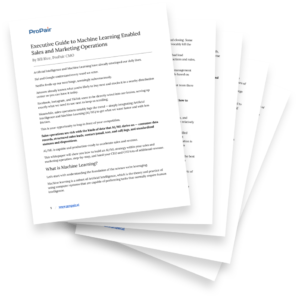What's in this article?
As a marketing director, you value streamlining your team’s processes. And you’ve likely heard the buzz that AI serves as a miracle solution for certain applications.
AI might be new, and a bit mysterious, but it’s not novel. It’s a powerful tool that now has practical applications for streamlining marketing automation and lead management processes within your CRM system.
It might feel overwhelming to get started, but we’re here to help with the most practical ways to add AI and machine learning to marketing operations so that you can maximize results and see a positive ROI.
Schedule a demo with ProPair to see the benefits of production-ready AI marketing applications.
10 marketing director strategies to streamline automation and lead management using AI
We’ve outlined the 10 ways to integrate AI into your CRM system. This will help you shape a plan that’s right for your business to get the results you need.
1. Define clear goals and objectives
To begin the process of a new CRM integration for lead management, first you’ll want to step back and look at the overall purpose.
What are your marketing automation goals? What results does marketing operations need to get to positively impact sales and revenue?
Once you’ve assessed your objectives, you can then identify where AI and machine learning can be added to provide the most value and streamline your processes.
2. Introduce AI to your system with predictive analytics
Often the best starting point for AI applications is to implement predictive analytics that analyze historical data.
AI predictive analytics works with your marketing, lead, and sales data to identify patterns, trends, and opportunities. This provides data-driven decision support that informs lead qualifying, nurturing, and personalization.
3. Implement predictive lead scoring models
To assist with automation, implementing AI lead scoring models will allow you to qualify leads as they flow in, in real-time. It scores leads by predicting how likely each one is to close a sale.
Machine learning models use several complex dimensions to score leads. This includes measuring basic lead demographics, along with multiple data points related to lead engagement with various marketing campaigns and assets.
Learn more — MQL vs SQL: How they’re different and how AI helps us decide
4. Use real-time lead distribution
Further automations involve routing the best leads to the right salesperson at the right time using AI lead assignment. Just as predictive models can measure a lead’s likelihood of converting, AI can also measure which next step in routing the lead will improve its chances of converting.
Leads are automatically routed to the next touch point or salesperson. And sales performance data is all part of the equation, matching leads to the right agent based on their expertise, location, etc. done automatically through AI.
5. Personalize marketing campaigns
AI helps marketing and sales teams personalize marketing campaigns with more intelligent audience segmentation within your CRM. It can inform what campaigns are best to use at each point in the sales cycle for each lead and even automatically alert you of changes or route leads to the next step.
Personalized marketing increases engagement with consumers, meeting them where they are and providing custom solutions and tailored content that helps support conversions.
6. Use Natural Language Processing (NLP) to qualify leads
NLP is an aspect of AI that pushes marketing operations even further with the capability to turn communications from leads into actionable data.
NLP interpreta and measures the way a lead words their interactions and responses to assess how sales-ready they are and whether they’re having a positive, negative, or neutral experience. This data informs what marketing campaigns and tactics are performing well and which ones have room for improvement.
It can be used to measure campaigns or even to incorporate new outreach tools like AI-powered chatbots and virtual assistants.
7. Automate lead nurturing
When leads reach the nurturing phase, it can be easy to lose track of the best way to get them back on the sales-ready path. AI-powered marketing tools like automated email campaigns, and chatbots help nurture leads automatically without manual management.
Nurture leads at various stages of the funnel without having to manage several tedious manual tasks. As a lead’s status changes to more sales-ready, AI can alert the team to re-prioritize them.
Get more from each lead with AI-powered lead nurturing. Download our free guide here.
8. Optimize marketing attribution
Accurately track and measure the effectiveness of your marketing efforts. Machine learning helps you attribute touchpoints to certain outcomes automatically. This helps you identify the most effective channels and campaigns to invest in.
Dive deeper into Lead Management Metrics: 10 KPIs Every Marketing Director Should Track
9. Continuously refine and iterate
Once you’ve added more AI capabilities to your CRM system to streamline your processes, continue to monitor and evaluate your system.
AI and machine learning provide deep insights into what’s working and what needs improvement. Take the time to maximize these data-driven insights to use the feedback and information that becomes visible and make the needed adjustments to improve overall performance.
10. Invest in expertise and software to support new AI efforts
As we shift into using more advanced technologies, build the support you need to maximize their effectiveness and get your entire team on board.
Invest in the right AI-powered software, consultants, and team members that will ensure effective implementation and overall success. Gauge your options to find the right mix of resources that best serves your business.
Read more — The Future of Lead Management: Emerging Trends and Technologies for Marketing Directors
Where to start: How to integrate AI into your CRM system
Getting new AI applications in place to streamline your marketing operations and lead management processes requires a well-thought approach.
Before you dive in, creating a roadmap will help you build a plan to implement AI technologies. Take the following steps:
- Explore what your current CRM system is capable of. What new features could you turn on or add? What kind of support is offered to maximize your current system?
- Find solutions within your CRM system or that can integrate with it to add AI capabilities. Start with small-scale applications and gradually scale up to technologies that make a larger impact as you strengthen your processes.
- Work with the right support to configure your data and machine learning models. Certain software providers can handle this for you or help you through the process.
- Let the experts train the models to learn from your historical and incoming lead data. From here you can work with the software and support to shape how these applications best serve your business.
Make the most of the leads you already have. Download our free guide to maximize aged leads with AI.
Want to learn more?: Integrating AI and Automation in Lead Management: Game Changer for Marketing Directors
Find the right solution to integrate AI and inform your marketing director strategies
When you’re ready to add AI technologies to your current processes, there are production-ready platforms available that make it simple and affordable.
ProPair, for example, is an AI platform that provides predictive analytics to support lead nurturing, lead assignment, and lead qualification.
With our proven machine learning models, we help you automatically know, as leads flow in, which ones are most likely to convert, along with which salesperson is most likely to convert them best and at the right time.
We even help you clean and configure your current data to optimize it for machine learning.
Schedule a free demo with ProPair to see how we can help.

How does AI increase sales?
Download our executive guide to understand the current state of AI and machine learning. We’ll show you how innovative sales and marketing organizations use it to get ahead of their competition.



